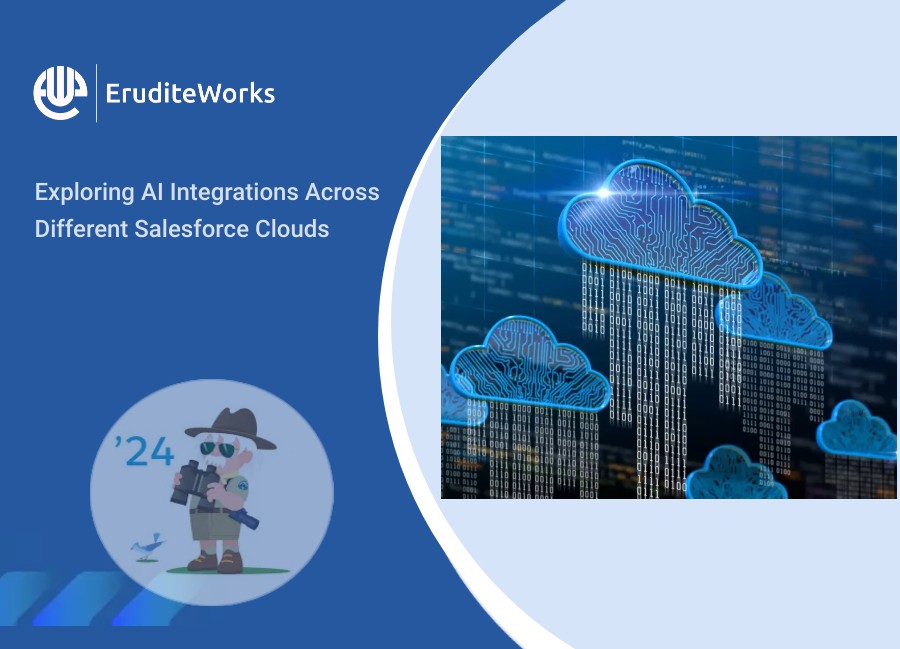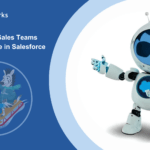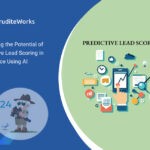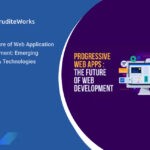While many platforms embrace this technology to a certain extent, Salesforce, a veritable game-changer in the CRM industry, determines the potential of artificial intelligence and incorporates it in its various cloud solutions to empower businesses globally.
It enables Salesforce to be a CRM trailblazer, tempting enterprises to use these cloud solutions on a large scale.
Did you know? As per a news story from Salesforce, nearly 75% of the users use generative AI for work and communication. It shows the craze of AI & why people love to integrate AI into their existing systems.
Let’s dive into this insightful blog to explore how AI works in the Salesforce empire and how integration partners use it effectively to boost business outcomes precisely and productively.
AI in Salesforce Cloud Suite: An Early Journey
In the dynamic landscape of business-customer relationships, the early journey of AI integration unfolds as a testament to innovation and foresight.
With a commitment to staying ahead of the curve, Salesforce is pioneering the infusion of artificial intelligence across its diverse cloud offerings to all the business verticals equally. This early exploration by Salesforce cloud consultants signifies a technological evolution and a strategic commitment to enhancing user experiences, streamlining processes, and fostering predictive intelligence.
As businesses increasingly recognize the transformative power of AI, Salesforce’s proactive approach to integrating this cutting-edge technology positions it as a leader in shaping the future landscape of CRM solutions.
The ongoing narrative of AI in the Salesforce Cloud Suite is an exciting journey, promising businesses a forward-thinking platform that adapts and evolves in tandem with the ever-changing demands of the digital era.
As a prominent customer relationship management (CRM) platform, it offers a suite of specialized clouds tailored to meet diverse business needs. Integrating Artificial Intelligence (AI) within its efficient cloud platforms enhances functionality, providing users with intelligent insights, automation, and predictive capabilities. Let’s explore each Salesforce Cloud and its relationship with AI:
Sales Cloud
Sales Cloud focuses on lead and opportunity management, enabling sales teams to streamline their processes. Integrating Sales Cloud through Einstein AI includes predictive lead scoring, which uses machine learning to analyze historical data and assign scores to leads based on their conversion potentials and possibilities.
Opportunity insights leverage AI to provide sales representatives with predictive analytics, guiding them in making informed decisions throughout the sales process.
Service Cloud
Service Cloud is designed for customer service and support, providing tools to streamline case management and enhance customer interactions. AI enhances Service Cloud with features like intelligent case routing, where algorithms analyze case details to route them to the most appropriate support agent.
AI-powered chatbots assist in resolving common queries, providing immediate responses, and even handling complex interactions, improving customer service efficiency.
Marketing Cloud
Marketing Cloud empowers teams to create personalized and targeted campaigns across various channels. AI in Marketing Cloud enables customized marketing campaigns by analyzing customer data and behavior.
Predictive analytics help understand customer preferences and optimize marketing strategies for better engagement. Additionally, AI-driven segmentation ensures that marketing messages are tailored to specific audience segments, maximizing the impact of campaigns.
Commerce Cloud
Commerce Cloud focuses on delivering seamless and personalized e-commerce experiences. AI enhances it by providing AI-driven product recommendations to users based on their preferences and purchase history.
Dynamic pricing strategies powered by AI algorithms help optimize pricing based on market conditions and customer behavior, contributing to increased sales and customer satisfaction.
Experience Cloud
Salesforce Experience Cloud, formerly known as Community Cloud, is a platform that enables organizations to build branded online communities for external stakeholders such as customers, partners, and employees.
The Experience Cloud enhances collaboration, engagement, and self-service by providing a personalized and unified experience.
Experience Cloud can leverage Artificial Intelligence to deliver even more personalized and intelligent interactions within these communities. It allows for analyzing user behaviors, preferences, and interactions, enabling the platform to provide tailored content recommendations.
Also, it ensures that community members receive relevant information, resources, and support, ultimately enhancing their experience. Additionally, AI-driven automation can optimize community workflows, improving efficiency and responsiveness.
As a result, Experience Cloud becomes a dynamic and intelligent platform that fosters meaningful connections, drives engagement, and delivers superior user experience for external stakeholders.
Analytics Cloud
Salesforce Analytics Cloud, or Einstein Analytics or Tableau Cloud, is a powerful platform allowing users to explore, visualize, and derive insights from their data. Integrating Artificial Intelligence (AI) within Analytics Cloud, specifically through Salesforce Einstein, amplifies the platform’s capabilities.
It leverages AI to analyze vast datasets automatically, uncover trends, and generate predictive insights. This integration enables users to go beyond traditional reporting and tap into the predictive power of AI for more informed decision-making.
With features like predictive analytics, brilliant data discovery, and automated insights, Salesforce Analytics Cloud becomes a dynamic tool for organizations to extract meaningful intelligence from their data, providing a foundation for strategic planning, forecasting, and data-driven actions.
The AI-powered capabilities of Analytics Cloud empower users to unlock hidden patterns, make data-driven predictions, and gain a deeper understanding of their business landscape.
Implementation Challenges and Solutions
While artificial intelligence has a promising set of significant benefits, it comes with challenges. Salesforce experts believe addressing these challenges is crucial for a successful deployment.
Here are some common implementation challenges and potential solutions:
Data Quality and Accessibility: Poor data quality or inaccessible data can hinder the effectiveness of AI algorithms. Establish robust data governance practices, clean and normalize data, and ensure accessibility by integrating data sources. Implement data validation checks to maintain high-quality data over time.
Integration Complexity: Integrating AI into existing Salesforce environments can be complex, especially with legacy systems or diverse data sources. Plan a phased implementation approach. Leverage middleware or integration platforms to simplify data connections. Collaborate with experienced integration specialists to ensure a seamless integration process.
User Adoption and Training: Users may need help adopting new AI-driven features, affecting the overall success of the implementation. Provide comprehensive training programs for users to familiarize themselves with the latest AI tools. Communicate the benefits and real-world use cases to showcase how AI enhances their daily workflows.
Data Privacy and Security Concerns: AI implementations often involve handling sensitive data and raising privacy and security concerns. Adhere to industry-standard security protocols and compliance regulations. Implement encryption measures, restrict data access based on user roles, and conduct regular security audits to identify and address vulnerabilities.
Customization and Scalability: Off-the-shelf AI solutions may need to align fully with specific business requirements, and scalability concerns may arise. Work with developers and AI specialists to customize solutions based on unique business needs. Ensure that the chosen AI tools can scale with the growing demands of the organization.
Monitoring and Optimization: Continuous monitoring makes identifying and rectifying issues or optimizing AI models easier. Implement monitoring tools to track AI performance, user engagement, and system health. Establish a feedback loop for ongoing optimization, incorporating user feedback and promptly addressing emerging issues.
By proactively addressing these challenges with tailored solutions, organizations can pave the way for a successful AI integration in Salesforce, realizing the intended benefits and improved business outcomes.
Best Practices for Successful AI Integrations
Salesforce consulting firms follow a strategic approach and adhere to best practices to ensure compliance, productivity and profound impacts on the business industry.
Firstly, defining clear and achievable objectives is essential to guide the integration process. A comprehensive data strategy encompassing data quality, accessibility, and security lays the foundation for accurate and reliable AI outcomes.
Continuous monitoring and optimization are critical; organizations should establish robust monitoring mechanisms to track AI performance and user engagement, allowing for timely adjustments and improvements.
Training and change management initiatives ensure that users are well-equipped to leverage AI capabilities effectively, fostering adoption and maximizing the value of the integration.
Finally, staying informed about emerging AI trends, technologies, and updates within the Salesforce ecosystem is crucial for future-proofing the integration and ensuring it evolves with the dynamic landscape of artificial intelligence.
Conclusion
The fusion of AI into Salesforce Clouds marks a real-time leap into a new era of technical prowess. This integration, from predictive analytics to automated insights, offers businesses a dynamic toolkit for instantaneous data-driven decision-making.
With the help of active Salesforce integration partners, challenges like data quality and user adoption are met with agile solutions, ensuring that the synergy between AI and Salesforce is a future promise and a present reality. In this fast-paced digital landscape, there is no end but the start of a new journey to a new technology cornerstone, with real-time performance where AI is a feature and the heartbeat of innovation.
Also Read: How AI is Revolutionizing Customer Relationship Management







0 Comments